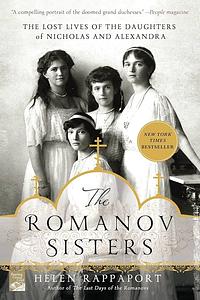Take a photo of a barcode or cover
August 1, 1918. Russia’s last Imperial Family is sent into Siberian exile, five months after Nicholas II abdicated the throne during the February Revolution.
Eleven months later they would be dead.
Their Palace would serve as tourist attraction for Soviet citizens and the occasional foreign visitor. The Bolsheviks wanted to evoke a sense of class hate and revolutionary fervor with their malignant depiction of Russia’s last Dynasty.
But visitors were also given a glimpse of the lost lives of the Imperial Children. Most biographies deal with their parents and their haemophiliac brother Alexis, rendering the four sisters as minor players. Rappaport aims to remedy that by focusing on the Grand Duchesses Olga, Tatiana, Maria and op Anastasia, daughters of Nicholas and Alexandra.
Eleven months later they would be dead.
Their Palace would serve as tourist attraction for Soviet citizens and the occasional foreign visitor. The Bolsheviks wanted to evoke a sense of class hate and revolutionary fervor with their malignant depiction of Russia’s last Dynasty.
But visitors were also given a glimpse of the lost lives of the Imperial Children. Most biographies deal with their parents and their haemophiliac brother Alexis, rendering the four sisters as minor players. Rappaport aims to remedy that by focusing on the Grand Duchesses Olga, Tatiana, Maria and op Anastasia, daughters of Nicholas and Alexandra.
It was wonderful! It really captured the personal lives of these sisters and their family.
Really exceptional and comprehensive look at their lives. The use of letters and journals really brought this to life, hearing things from the royal family and those around them personally. It never stops the ending from having such an awful impact.
I really enjoyed learning more about their work during WWI as nurses (well, Olga and Tatiana). You get more insight into the character of each family member and it is a great companion to (and at some part references) the book [b:Thirteen Years at the Russian Court|25571592|Thirteen Years at the Russian Court|Pierre Gilliard|https://i.gr-assets.com/images/S/compressed.photo.goodreads.com/books/1432155435l/25571592._SX50_.jpg|11386887] which I read earlier this month. I think it holds better context with the plethora of references in the bibliography and more specific details from inside and outside the family.
But as for "Alix", her devotion to her husband “Nicky” and her children was so strong I don’t know how she was supposed to avoid what was coming as the dice had already been cast. I think they were doomed if they did and if they didn’t. I couldn’t help so strongly wishing Olga and Tatiana had been married out of Russia so they could have been spared---but this wasn’t what they wanted either.
I really enjoyed learning more about their work during WWI as nurses (well, Olga and Tatiana). You get more insight into the character of each family member and it is a great companion to (and at some part references) the book [b:Thirteen Years at the Russian Court|25571592|Thirteen Years at the Russian Court|Pierre Gilliard|https://i.gr-assets.com/images/S/compressed.photo.goodreads.com/books/1432155435l/25571592._SX50_.jpg|11386887] which I read earlier this month. I think it holds better context with the plethora of references in the bibliography and more specific details from inside and outside the family.
But as for "Alix", her devotion to her husband “Nicky” and her children was so strong I don’t know how she was supposed to avoid what was coming as the dice had already been cast. I think they were doomed if they did and if they didn’t. I couldn’t help so strongly wishing Olga and Tatiana had been married out of Russia so they could have been spared---but this wasn’t what they wanted either.
informative
reflective
medium-paced
The story was interesting, but more a story about the royal family than the sisters, considering that so much of it focused on the parents. The sisters don't even begin to be born until well into the book. Also, I thought this was very romanticized in that, even with a minimal amount of Russian studies, I see this is very one sided. You would think Nicholas was just a bumbling idiot who had nothing to do with any of the events happening in his country. The people revolted for many reasons, but he certainly had a hand in some of them, a fact very much glossed over in this book. The book definitely leaves you with the feeling that this was the wrong man in the wrong place, probably true, but unfortunately for him and a lot of Russians, he was who he was. I was most intrigued by the what ifs... What if Tatiana had married the Prince of Wales, what if the parents had accepted any of the many marriage offers - would some of the girls have been safe? They were very reluctant to let their children become adults, and ironically, that might have saved them. I liked Maria the best, followed by Tatiana. Anastasia was pretty much a brat.
I really enjoyed this book focusing on the sisters as a collectively overlooked group and as important individuals. The passion Rappaport has for the subject matter really shined through the content making it engaging and memorable to read.
Rappaport also helped in cementing my opinion that Tsarista Alexandra (Alix of Hesse) was incredibly successful at infantilizing her children: Olga, Tatiana, Maria, Anastasia, AND Alexis. Alexandra contradicted herself by providing her daughters with a solid education (more so Olga and Tatiana as WW1 affected Maria and Anastasia's schooling more ~1914-1917), public facing roles on committee boards and pushing Olga and Tatiana to be "Sisters of Mercy" aka Red Cross Nurses during WW1 while simultaneously limiting their social circle to their siblings and members of the Tsar's Escort or household staff at Tsarskoe Selo which resulted in isolation from Russian Society. Due to their limited social circle and parents (Nicholas II and Alexandra) low importance on acceptable suitors, it then makes sense that the sisters purposely sabotaging the few matches who came to call from outside Russia. Ultimately its this social isolation maintained by Alexandra and Alexandra's failure to recognize the seriousness of the Russian Revolution that contributed to the family's annihilation July 1918.
Rappaport also helped in cementing my opinion that Tsarista Alexandra (Alix of Hesse) was incredibly successful at infantilizing her children: Olga, Tatiana, Maria, Anastasia, AND Alexis. Alexandra contradicted herself by providing her daughters with a solid education (more so Olga and Tatiana as WW1 affected Maria and Anastasia's schooling more ~1914-1917), public facing roles on committee boards and pushing Olga and Tatiana to be "Sisters of Mercy" aka Red Cross Nurses during WW1 while simultaneously limiting their social circle to their siblings and members of the Tsar's Escort or household staff at Tsarskoe Selo which resulted in isolation from Russian Society. Due to their limited social circle and parents (Nicholas II and Alexandra) low importance on acceptable suitors, it then makes sense that the sisters purposely sabotaging the few matches who came to call from outside Russia. Ultimately its this social isolation maintained by Alexandra and Alexandra's failure to recognize the seriousness of the Russian Revolution that contributed to the family's annihilation July 1918.
I cannot get this book out of my mind. I didn’t know very much about the lives of the Romanovs before the Bolshevik Revolution. This book gives an inside view of the girls’ lives, thoughts, etc. it’s difficult to read at some points because of all the what if’s or “if they just had done this” or “ can’t you see what you’re doing!” It’s very revealing as to the motivations and family culture they lived in. Having read I Am Anastasia by Ariel Lawhon and other books about that era, I appreciated having another view of the story.
informative
sad
slow-paced
informative
medium-paced
Was far less about the sisters than I anticipated. It would have been more aptly named ‘Alexandra’ with how much this book talked about her and her life.





